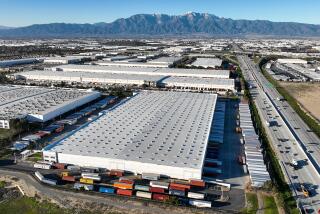Chain Steps on Gas
- Share via
Jose Gonzalez doesn’t look particularly fearsome, but to thousands of his Southern California competitors, the smiling Chief Auto Parts store manager is a big threat.
His retail store in Pico Rivera is one of three dozen Chief locations with an aggressive wholesale operation that is slashing prices and offering a warranty unique in the industry in an effort to lure orders from garages, mechanics and repair shops.
Chief Auto Parts Inc., a 560-store chain that has had its ups and downs in retailing, wants to grab a healthy chunk of the fragmented wholesale business, which generated $45 billion in sales last year and is growing.
The Dallas-based company believes its new wholesale operation--Professional Parts Warehouse--ultimately will boost annual sales by 40% or so, says Bill Pantuso, head of wholesale business development. Privately held Chief’s had an estimated $450 million in total sales last year.
The move into wholesale also could bring some relief to Southern California car owners. Professional Parts Warehouse’s prices are undercutting the competition by 10% to 20%, and some garages figure to pass the savings along to customers.
But Chief’s new operation is rattling competitors in an industry dominated by car dealers and small independent suppliers.
“It’s already war out there, and this just makes it worse,” groans Jim Hardesty, whose J&B; Auto Parts in Orange is one of the region’s most successful independent wholesalers. He said he already has lost a couple of customers to Chief, which recently opened a wholesale operation in Orange.
Chief’s move into wholesaling is an example of how many companies are seeking to improve their own performance by using their core businesses as a launching pad for new ventures.
Irvine-based Taco Bell Corp., for example, now sells canned refried beans, taco shells and salsa in supermarkets. And Microsoft Corp., not content to dominate the computer software business, has launched subsidiary units that use the Internet to sell everything from new cars to world cruises.
Chief wants its wholesale operation to dominate the auto parts industry by offering centralized distribution centers that promise to deliver quality goods quickly, and at low prices.
Its success remains to be seen but, in the meantime, the company expects to create several hundred new jobs in Southern California’s thriving automotive industry.
Chief’s venture into wholesaling promises more opportunities for growth than in the retail side of the auto parts industry. Parts retailing has stalled as cars have become more complex, their performance dependent as much on factory programmed mini-computers under the hoods as on so-called hard parts like spark plugs and butterfly valves.
It is difficult these days for most do-it-yourself mechanics to do it themselves--so they take their vehicles to the local garage.
As a result, the parts-selling industry has been marked by a consolidation frenzy, as big companies scurry to survive by gobbling up smaller competitors. More companies, including national operators such as Pep Boys, are turning to wholesaling to keep or increase market share.
Chief, which operates in five states, has itself changed hands three times since it was founded in Norwalk in 1955, a reflection of how unsettled the retail parts industry has become.
Convenience store operator Southland Corp. bought the company from its founders in 1978 and changed it from a well-stocked retailer of national brands into a chain with limited inventories and lots of store brand products.
As Southland’s fortunes soured in the late 1980s, so did Chief’s. But in 1988, Chief management reclaimed the company in a leveraged buyout financed by Shearson Lehman Brothers Holding Inc., and began rebuilding it. Store brands were replaced with nationally known products, inventory was doubled and Chief started building larger stores.
In 1994, Shearson Lehman sold Chief to a unit of Los Angeles-based Trust Company of the West. With the financial clout of the giant trust and investment bank behind them, Chief’s managers began to test the wholesaling concept while shoring up the retail side.
*
Under Southland, the typical Chief store was 5,000 square feet with about 12,000 items in stock. The stores emphasized convenience and appearance items such as replacement bulbs, waxes and chrome license plate frames, and cut back on parts for major systems like suspensions and engines.
Now Chief is building 6,000-square-foot stores offering an average of 18,000 parts. At stores that house a wholesale operation, the parts count grows to 21,000.
Gonzalez, whose Pico Rivera retail store houses one of the 17 Chief wholesale units in Southern California, says the wholesale operation has doubled his revenue. He has hired eight new employees and bought four pickup trucks for deliveries to keep up with the new orders from professional auto repair shops.
“It’s been great,” he said, noting that his store’s sales had been flat before the Professional Parts Warehouse was added.
Chief first tested the wholesale concept in Texas, but has set up the largest operation in Southern California, its biggest market with 245 stores. Ultimately, Chief plans to put wholesale units in 50 to 60 of its Southern California stores, says Sal Ramos, regional manager of Professional Parts Warehouse.
So many are needed because the typical wholesale operation’s primary market area is within a five-mile radius. Deliveries take too long if distances get much greater.
Alan Cessna, manager of South Coast Goodyear in Santa Ana, has been buying parts from Chief’s Professional Parts Warehouse for about four months.
He said he was leery at first, but was won over by the company’s lower prices and its warranties, which have saved him several hundred dollars in labor costs. Under the warranty program, the first of its kind in the industry, the company reimburses its best customers for the cost of labor to replace a defective part.
“It’s an unusual and controversial thing,” says Skip Potter of the Auto Service Industry Assn.
Most manufacturers and wholesalers believe parts failures are usually caused by poor installation. Reimbursing a garage for replacement labor could reward poor workmanship, industry insiders say. It’s also a feature that most small independent wholesalers cannot afford to match and could steal away their business.
Critics say Chief is treading dangerous ground. While discount pricing and the labor warranty are is strongest selling points, the costs could eat up profits and force it to do away with the very programs that make it most competitive.
Professional mechanics want parts suppliers who offer speedy delivery of quality parts they won’t have to replace, says Kevin Wright, owner of S&W; Automotive in Fountain Valley. They also demand to be served by knowledgeable people when they call in their orders.
“It’s how we survive,” says Wright, who prefers to use factory parts that he buys mostly from local new car dealers’ wholesaling operations.
*
Key to Chief’s system are the computerized order centers in Dallas and Van Nuys. Instead of calling an individual location, customers dial an 800 number and are connected with industry-certified parts specialists.
The central ordering system also lets Professional Parts Warehouse operate as a virtual mega-store. The order desk can call on all of Chief’s retail outlets in the area to find parts that might not be in stock at a particular wholesale store.
The company also has leased a 424,000-square-foot warehouse in Ontario that it is stocking with more than 200,000 auto parts to supply its stores in California, Arizona and Nevada.
Not all competitors are awed by Chief’s program.Some believe the company’s lower prices are a marketing gimmick and that Professional Parts will start losing customers once it raises prices back up to industry norms.
But David Eisenberg, Chief’s president, predicts that retail chains will win the battle over independent auto parts wholesalers for professional mechanics’ parts business.
Repair shops’ loyalty to independent parts suppliers, “is going out the window” as chains offer lower prices and efficient delivery, he said.
(BEGIN TEXT OF INFOBOX / INFOGRAPHIC)
Chief of Parts
Chief Auto Parts, one of the region’s largest do-it-yourself auto parts chains, is using its considerable buying power to launch a wholesale parts division, Professional Parts Warehouse, which caters to professional repair shops. A look at PPW and the rapidly growing wholesale service market:
Professional Parts Warehouse
* Headquarters: Dallas
* Type of business: Wholesale auto parts sales to professional repair shops
* Founded: 1994
* President/CEO: David Eisenberg
* Parent: Chief Auto Parts
* Locations: 17 warehouse stores in Los Angeles area, 12 in Dallas/Fort Worth, four in Sacramento, two in Las Vegas
* Employees: 250
Market Shift
Sales of auto parts at professional repair shops are growing faster than at retail auto parts stores that cater to do-it-yourselfers. Auto parts sales, in billions:
1990
Professional service centers*: $40.2
Retail parts stores (sales to do-it-yourself mechanics): $18.2
*
1993
Professional service centers*: $45.5
Retail parts stores (sales to do-it-yourself mechanics): $18.7
*
1996
Professional service centers*: $50.7
Retail parts stores (sales to do-it-yourself mechanics): $19.2
*
1997**
Professional service centers*: $54.0
Retail parts stores (sales to do-it-yourself mechanics): $19.4
*Reflects retail price charged customers for parts purchased at wholesale.
**Estimate
Source: Lang Marketing Resources
Researched by JANICE L. JONES / Los Angeles Times
More to Read
Inside the business of entertainment
The Wide Shot brings you news, analysis and insights on everything from streaming wars to production — and what it all means for the future.
You may occasionally receive promotional content from the Los Angeles Times.









